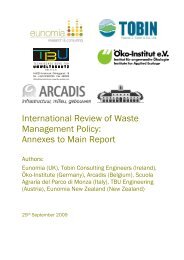Report of the Local Government Efficiency Review Group
Report of the Local Government Efficiency Review Group
Report of the Local Government Efficiency Review Group
You also want an ePaper? Increase the reach of your titles
YUMPU automatically turns print PDFs into web optimized ePapers that Google loves.
11.1.7 Interest rate exposure, on <strong>the</strong> o<strong>the</strong>r hand, may be greater than currently<br />
realised, in situations where local authorities may be borrowing on a<br />
variable rate basis and lending on a fixed (e.g. house purchase loans), or<br />
vice versa. Long-term debt is obtained from <strong>the</strong> Housing Finance Agency,<br />
<strong>the</strong> National Treasury Management Agency, and <strong>the</strong> European Investment<br />
Bank, all <strong>of</strong> which provide very favourable terms when compared to those<br />
available currently from <strong>the</strong> private sector.<br />
11.1.8 There are two key disciplines that apply to local government spending. The<br />
first is that local authority revenue budgets as adopted by <strong>the</strong>ir members<br />
must be balanced and <strong>the</strong> commercial rate struck accordingly.<br />
11.1.9 The second discipline relates to <strong>the</strong> General <strong>Government</strong> Balance (GGB),<br />
under which borrowing limits are set for <strong>the</strong> various elements <strong>of</strong> <strong>the</strong> public<br />
service. The GGB measures <strong>the</strong> fiscal performance <strong>of</strong> <strong>the</strong> whole General<br />
<strong>Government</strong> Sector, which includes <strong>the</strong> Exchequer, <strong>the</strong> Social Insurance<br />
Fund, <strong>the</strong> non-commercial semi-state bodies, <strong>the</strong> National Pensions<br />
Reserve Fund (and o<strong>the</strong>r extra-budgetary funds), <strong>the</strong> Vocational Education<br />
Committees, and local authorities. During <strong>the</strong> first half <strong>of</strong> <strong>the</strong> decade<br />
substantial income accrued to local authorities due to <strong>the</strong> receipt <strong>of</strong><br />
development levies. The decline in construction activity since 2008 has<br />
seen a reversal <strong>of</strong> fortune for local authorities, with <strong>the</strong>se receipts largely<br />
drying up.<br />
11.1.10 However, local authorities have accumulated receipts which have been<br />
earmarked for capital works. Some <strong>of</strong> <strong>the</strong>se capital works require a<br />
contribution by <strong>the</strong> local authorities, particularly for water and waste water<br />
treatment facilities. The spending <strong>of</strong> <strong>the</strong>se accumulated funds would, in <strong>the</strong><br />
absence <strong>of</strong> fur<strong>the</strong>r receipts, result in a worsening <strong>of</strong> <strong>the</strong> GGB position and to<br />
this end local authorities have been instructed that <strong>the</strong>ir capital spend from<br />
development levies is capped at <strong>the</strong> level <strong>of</strong> development levy receipts in<br />
<strong>the</strong> current year. The consequence <strong>of</strong> this is that many capital projects<br />
have been postponed so as not to breach <strong>the</strong> GGB requirements.<br />
11.1.11 <strong>Local</strong> authorities require borrowing both in <strong>the</strong> short-term and in <strong>the</strong> longerterm<br />
for a significant part <strong>of</strong> <strong>the</strong>ir funding. As regards short-term borrowing,<br />
temporary borrowing in <strong>the</strong> form <strong>of</strong> overdraft facilities has been a feature <strong>of</strong><br />
local government finance for decades. In a 2009 survey <strong>of</strong> 32 local<br />
authorities, it was found that 17 local authorities had <strong>the</strong>ir banking services<br />
with Bank <strong>of</strong> Ireland, 14 banked with AIB and 1 with Ulster Bank.<br />
11.1.12 A recent report by <strong>the</strong> Office for <strong>Local</strong> Authority Management illustrated that<br />
some local authorities are being charged higher margins than o<strong>the</strong>rs by <strong>the</strong><br />
banks. Given that <strong>the</strong>re are only three banks involved, <strong>the</strong> <strong>Group</strong> considers<br />
that it would be appropriate that a uniform overdraft rate be procured at<br />
national level for those local authorities banking with <strong>the</strong> different overdraft<br />
lenders.<br />
11.1.13 A coordinated approach between local authorities to match overdraft<br />
requirements with surpluses, based on base interest rates with no premium<br />
144
















